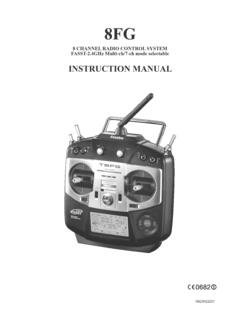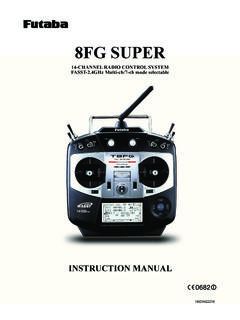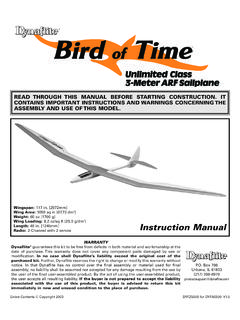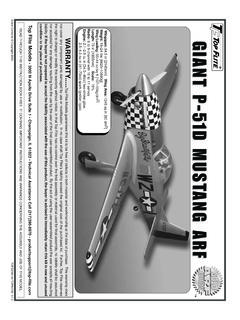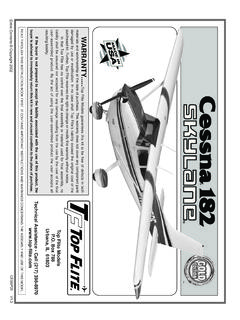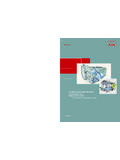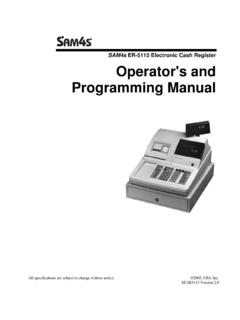Transcription of 2.4GHZ RADIO CONTROL SYSTEM INSTRUCTION …
1 TTX300TM RADIO CONTROL SYSTEMINSTRUCTION MANUALT hank you for making the Tactic TTX300 SLT SYSTEM your choice for RADIO CONTROL ! This SYSTEM uses modern Spread Spectrum technology an innovation that allows for automatic channel selection and interference-free CONTROL of R/C safe operation and best results, it s strongly recommended to read this manual in its entirety before use! Also read and understand the instructions included with the model. Damage resulting from misuse or modifi cation will void your Spread Spectrum Technology Ergonomic and stylish case design Transmitter can bind to multiple receivers Tiny, lightweight receiver with internal antenna Built-in fail-safe Steering and Throttle trim dials Steering rate adjustment Power LED with low battery warning indication Multi-function programmable 3rd channel Steering and throttle end point adjustments2 TRANSMITTERThe transmitter (Tx) requires 4 AA batteries.
2 Non-rechargeable alkaline or rechargeable nickel-cadmium (NiCd) or nickel-metal hydride (NiMH) cells can be used. Do not mix old and new cells, or mix non-rechargeable alkaline cells with rechargeable NiCd or NiMH cells, etc. See the SERVOS AND ACCESSORIES section at the end of this manual for optional rechargeable NiCd and NiMH batteries and chargers. Note the TTX300 transmitter does not include a charge jack for rechargeable cells. A separate AA cell charger will be : Do not operate an R/C model with weak batteries as it could result in reduced range and/or possible loss of CONTROL !Figure 2 PowerLEDOn/OffPowerSwitchThrottleReversi ngSteeringReversingSteeringRateSteeringT rimThrottleTrimChannel 3 ButtonsPress the power switch to turn the Tx on (see fi gure 2).
3 The POWER LED should illuminate. If not, turn off the Tx and check the batteries to make sure each cell is fi rmly in place and in the proper direction. If the Tx LED blinks, the batteries are low on power and should be THE RECEIVER TO THE TRANSMITTERFor proper installation and operation of the transmitter and receiver SYSTEM , it is necessary to bind them together electronically. This ensures sole communication between the two and prevents other transmitters from being able to CONTROL the receiver. To bind the Tx and Rx: 1. Turn on the transmitter. 2. Apply power to the receiver (see the INSTALLATION section that follows for how to do this).
4 3 3. If the receiver s LED fl ashes once and then stays on, the Rx is already bound to the Tx and you can skip to the next section. Otherwise, push and hold the receiver s BIND button until its LED glows red and then turns off after about one second. 4. Release the bind button. 5. If the binding is successful, the LED will fl ash once and then remain ON. 6. Test for proper Tx / Rx functionality by completing the next section. If it doesn t seem the RADIO has bound properly, repeat steps 1-6 : Mount the receiver as specifi ed in your model s instructions . As a guideline, mount in a secure location using double-sided tape. Route the servo wires so they do not interfere with any moving parts.
5 For boat applications, it s highly recommended to wrap the receiver in a balloon or enclose it in a water-tight 3(1) Steering Servo(B) Battery / Switch(2) Throttle ServoLinkButtonLink LEDC hannel 3 Servos: See the SERVOS AND ACCESSORIES section at the end of this manual for a full list of optional servos. CENTER THE TRIM DIALS on the Tx. Mount the servos inside the model and connect the linkages to the servo using an appropriate length servo arm. Make sure all mechanical linkages are free of obstructions and can move smoothly. Connect the servos to the receiver as shown in Figure 3. Turn the transmitter s trim dials to fi nely adjust the servo s center point as needed to match the Speed CONTROL (ESC): If using an electronic speed CONTROL , connect it to channel 2 of the receiver (throttle).
6 Center the transmitter s throttle trim and follow the ESC instructions for of the TTX300 features are adjusted electronically by entering the programming mode. To enter the programming mode, follow these steps:1. With the transmitter turned off, turn steering wheel full right, pull the trigger to the full throttle position and turn the transmitter s power switch to ON. The LED will fl ash to confi rm when performed correctly. 2. Release the wheel and trigger at this Point AdjustmentsSteering: 1. Enter programming mode. 2. LEFT EPA: Turn wheel FULL COUNTERCLOCKWISE, use 3rd channel push buttons to adjust. 3. RIGHT EPA: Turn wheel FULL CLOCKWISE, use 3rd channel push buttons to adjust.
7 Throttle: 1. Enter programming mode. 2. THROTTLE EPA: Pull trigger to the FULL THROTTLE position, use 3rd channel push buttons to adjust. 3. BRAKE EPA: Push trigger to the FULL BRAKE position, use 3rd channel push buttons to 3:The TTX300 3rd channel is programmable and offers a wide variety of options to suit many applications. Selecting the number of positions and end point adjustments are performed at the same time. To change the function and set end point adjustments for CH3, follow these steps: REVERSE: Press and hold the bottom push button and power ON transmitter. The LED will fl ash one time. After 3 seconds, the LED will fl ash two times when performed correctly.
8 Release the bottom push button. MULTI-POSITION: The TTX300 3rd channel can be programmed to function as 2 position, 3 position, 4 position or proportional CONTROL switch. Selecting each position and end points for each position are performed simultaneously. The default position of CH3 is 2 position. To change the function of CH3, follow these steps: 1. Enter programming mode: Press and hold the top push button, power ON transmitter. Continue to hold until the LED fl ashes fi ve times. Release the top push button. 2. Use CH3 push buttons to adjust CH3 accessory/servo to desired 1st position. Turn steering wheel clockwise (right) to confi rm position 1.
9 The LED will fl ash one time to confi rm position 1 has been saved. Note: Press and holding CH3 push buttons will adjust rapidly. Press and release will fi nely adjust useCH3 buttonsto turn wheelclockwiseto Moving the steering wheel during adjustment of CH3 will save the position. Do not move steering wheel unless position is ready to be Use CH3 push buttons to adjust CH3 accessory/servo to desired 2nd position. Turn steering wheel clockwise (right) to confi rm position 2. The LED will fl ash two times to confi rm position 2 has been saved. If programming for two position switch, skip to step 6. Otherwise, proceed to step 5 to program 3rd or 4th position.
10 4. If programming as 3 or 4 position switch, follow the procedures in steps 2 and 3 and select additional positions (3 and/or 4). Turn steering wheel clockwise (right) to confi rm each individual position. The LED will fl ash in relation to the position that is being saved. Three fl ashes is 3rd position, 4 fl ashes is 4th position. Proceed to step 6 when programming as 3 or 4 position switch has been completed. 5. To program CH3 as proportional, enter programming mode and select desired position 1 as listed in Step 2 above. Use CH3 push buttons to adjust to desired end point and turn steering wheel clockwise four times. The LED will fl ash fi ve times to confi rm the position has been saved.
